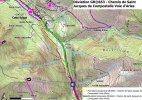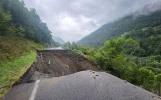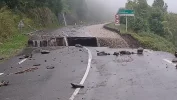Some years ago I did that stage. I begun my Camino Aragones exactly at Urdos. Later I wrote a memories book for myself and friends. This is what I wrote about the stretch from Urdos to Somport. Hope it helps.
Urdos is a very small town with only two rows of houses along the road. It is located at the start of the mountain pass and seems the ideal place to attack Somport, since it is right there where the steepest climb begins. The taxi drops me off at the bus stop in the small town and I prepare to start walking. At that moment a pilgrim of about sixty years old arrives and asks me in French if I am going to start now. When I ask him yes, he offers to take a photo of me. I thank him for the photo (which he ultimately does not take, because he gets confused with the camera controls and I will only realise this at the end of the day) and I ask him if he would like a coffee in a nearby bar, since I have not had breakfast yet and I want to have something to drink. He accepts and we head to a bar that can be seen a few metres up. Now we speak in English, which we both master better than French, since the pilgrim in question is Dutch, his name is Jac and he has already been on the Camino through France for ten days. He plans to reach Pamplona this year. He has already done several Caminos, like me, and he is another addict. I tell him that I have a son living in Eindhoven. It takes him a while to understand the name of the city and suddenly a light comes on and he says:
- Ah, he lives in “aind-joven”!
It is obvious that my Dutch pronunciation is terrible...
We drink our coffee and separate. He wants to continue along the road to the tunnel entrance and I want to go the normal route, through the countryside. So Jac leaves a little earlier and I stay finishing the coffee and putting the first stamp on my credential.
On leaving the bar I cross the small village of typically Basque stone houses lined up on the sides of the road. The village has that clean and well-kept appearance that French villages have, however small they may be, and which is difficult to achieve in Spain. On leaving the village, always uphill on the road, I quickly locate the turnoff to the Camino but I get a surprise. There is a sign that says that due to landslides the path is temporarily diverted onto the road. Nothing prevents me from continuing along the path, but I don't want to take such a risk at the beginning, so I head up the road, which seems the safest option.
The first few kilometers of road are comfortable. The track is wide and has a shoulder that is easy to drive on and without excessive danger. There is a lot of traffic heading towards Spain, many Moroccans heading home and I suppose many weekend tourists; but hardly any cars go down towards France.
The Pyrenean landscape is spectacular. The road goes up between high green mountains. In this part of the Pyrenees the mountains are wilder and steeper than in the Roncesvalles part. There they are more rounded and here they have very sharp peaks, enormous cliffs and very steep slopes. The Camino goes up between two enormous mountains through which a fast-flowing stream runs.
I continue to climb and about a kilometer from Urdos, which is now very far down, there is an enormous crucified Christ, about three meters high, planted on the side of the road. Here when they say to put up a Cross, they don't mince words. It is very pretty and the figure is worthy of a church altar, but here it is, at the foot of the Camino so that we pilgrims can greet it.
A couple of kilometers further on the road narrows a lot and becomes very dangerous. It is sandwiched between a high cliff and a steep drop towards the river, which barely leaves room, not only for a shoulder, but for two cars to pass at the same time. There is a point where the car going up has to stop to make room for the one going down. I pass the area, about three hundred meters long, very carefully, quite quickly despite the slope and continually crossing sideways, always looking for the one with the best visibility at each bend.
After this very dangerous area the road widens a little again and continues to climb continuously, without stopping. At one point, I pass a house with a wooden fence made of ski boards.
After five kilometers on this route, we approach the mouth of the Somport Tunnel. It is time to leave the road and start to really climb the mountain on its slope. At a well-signposted point, a path leads off to the left that begins to climb the mountain with a very steep incline. This would also be a perfect point to start this stage, avoiding this first stretch of road. Looking back, you can still see the point where Urdos is located and the gorges that surround it. It is a beautiful view.
The first few meters of the path that goes up to Somport are very hard, but it soon becomes a bit easier and then I can start to really enjoy it.
It's really a wonder. A narrow path climbs through a dense forest. The stones and trees that line the path are completely covered in moss. With yesterday's rain everything is damp and the greens of the forest are resplendent. It looks like a fairy-tale path. The ground is covered with fallen leaves and every few hundred meters the path is crossed by streams that flow down swollen by the rain and that you have to cross by going from stone to stone.
It is a very wild path, with sometimes complicated steps and where from time to time there are areas that have collapsed towards the hillside due to the rain, thus narrowing the path even more. The path thus climbs tirelessly through the mountain with slopes that are sometimes very steep and that make me sweat profusely. It is a very hard climb, but beautiful. We are in the Pyrenees National Park, a protected area where there are bear reserves, which I hope not to see.
I have not seen any pilgrims since I left Urdos. The Camino here is not excessively signposted, but as it follows the same route as a French rural path, between the signs for one and the other, there is not much doubt: always uphill.
What you can see below is the river, which in this area seems to be dammed. The water is completely brown due to the dragging of soil from the rains that fell yesterday and it is very curious to look down and see a mass of brown water covering everything.
After five kilometers along this tiring and grateful path, the height begins to be noticeable and the trees begin to be scarcer. The path now goes through areas of grass where it often disappears, covered by grass, so you have to imagine where to go. It is not complicated and the signage in France, scarcer than in Spain and composed exclusively of small metal signs about five centimeters on each side with the GR indication attached to trees or posts, is sufficient and not as outrageous as ours.
Always going uphill you get to an area where huge masses of rock practically block the path, and you have no choice but to go up splashing through a small, very rocky stream that is swollen by yesterday's rains.
Finally, the path crosses a wide meadow to a road that you can see above and which you access by a steep slope. We are barely two kilometers from Somport and here on the road the signage is apparently non-existent. As I go up I see that there are people up there: a cyclist going down the road and two groups of pilgrims, each of whom takes a different direction. Perfect, let's see which is the good one… When I get to the road I see that in fact the signage does not exist. According to my perfect guide (the one I make myself) now I have to go down the road a little to go up the other side. So that is what I do, and I am right. A little further down there is one of the tiny signs on the path and further ahead one of the few arrows I have seen tells you to cross the road and take a path that, of course, starts to climb steeply.
So up again through some meadows where the path is barely visible, and crossing a couple of wooden bridges takes me to a beautiful little forest through which a stream runs thundering down from the top, forming beautiful waterfalls at certain points. Another stretch of elven forest that today's stage presents us with.
In this stretch I see that Jac, the Dutchman, is a little ahead of me. I don't make any effort to catch up with him, because the path, although beautiful, is very hard and steep with rocky areas where you have to be very careful to avoid slipping and twisting. So, each at his own pace, we reach the road again, now very close to the top of Somport.
Now you have to cross it and go through a huge parking lot, at the end of which you can see a path that goes up to some houses that you can see on high. It is the end of the climb. The houses you can see are already the Somport snow center.
But until you get there, the climb is one of the toughest of the day. A grass path with a steep slope that I climb little by little, panting and having to stop three times in just three hundred meters. A torture that ends when I reach the height of the houses, where you can already see the old customs that marks the border between Spain and France and a blue sign of the European community that indicates the entry into our country.
Well, Somport is already crowned. It has been thirteen kilometers of very hard, but beautiful climb from seven hundred meters in Urdos to the one thousand six hundred and forty where I am now. The height I am at is greater than that of Roncesvalles, since there the Lepoeder pass only reaches one thousand four hundred and fifty meters. It is one of the most beautiful climbs I have ever done. It was one o'clock, so it took me four hours to do thirteen kilometers, which means that the pace was about three kilometers per hour, a very slow pace that gives an idea of how hard the climb is.
As soon as I enter Spain there are three monuments to see: a small open-air chapel that is just an open shed for a Virgin of Pilar, which is at the top of the mountain; a curious monument to the pilgrim, made of iron and simple but very pretty; and the best and most Spanish of all the monuments: a bar to which I immediately head.























